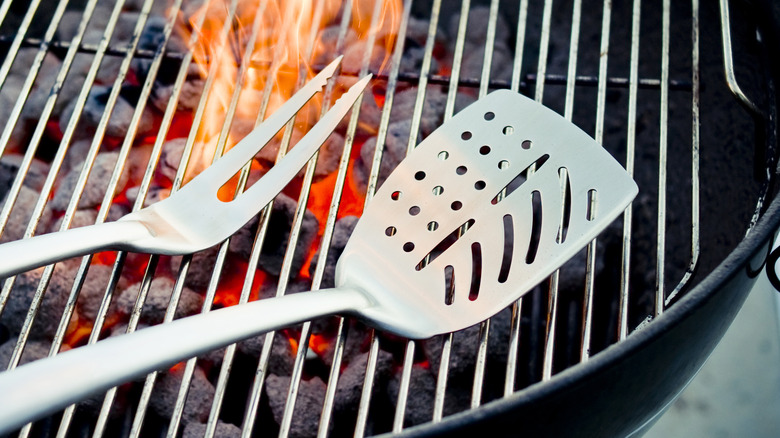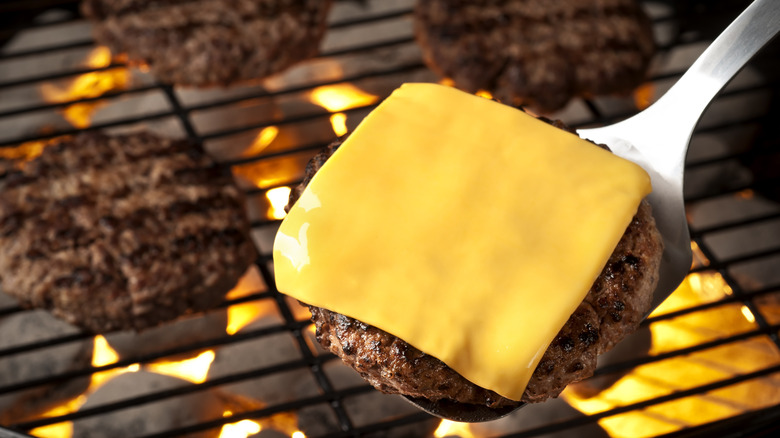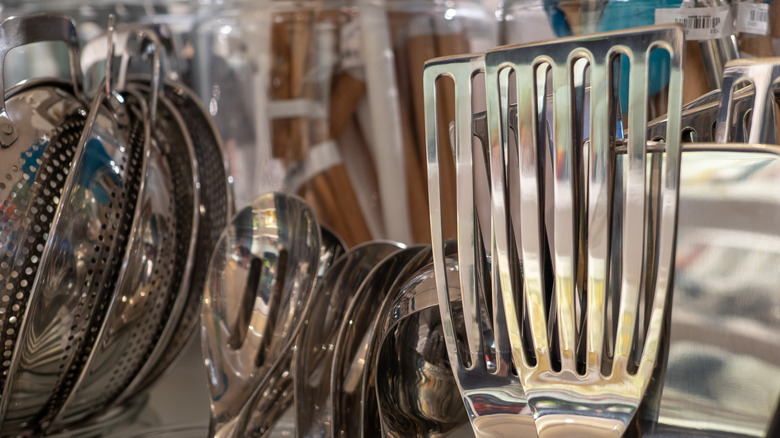Do The Holes In A Spatula Serve A Purpose?
Spatulas are one of those kitchen appliances to which you probably don't devote a whole lot of thought. You use them, of course (maybe even in kitchen hacks involving jam), but you probably don't devote much thought to them. After all, one spatula is as good as another, right? There's really no reason to care about what kind you're using.
Turns out, that's not true at all. You absolutely should care about what kind of spatula you're working with, and in most situations, you want a slotted one. Those holes aren't there for decorative reasons; they actually do serve a couple of purposes. One of those purposes is probably something you would expect: The holes or grooves in a spatula help with the drainage of excess liquids, which is great for meat, which tends to produce a lot of liquid during the cooking process (and before it, which is why there's that absorbent pad in packaged meats).
But there's another purpose to them, too, and it's one you might not think of. See, thanks to the power of physics, a spatula with holes has an advantage over one without them: It's way, way better at picking up more delicate items.
Slotted spatulas are better at picking things up because they reduce surface tension
As with a slotted spoon, the first thing that comes to mind with a slotted spatula is how liquid isn't going to get stuck to the surface and potentially create a mess. This is particularly good in the case of fried foods, where a slotted spatula allows as much oil as possible to run off during the transfer process, keeping the food at maximum crispiness. But this isn't the only benefit of a slotted spatula.
Slotted spatulas truly shine at picking up more delicate foods. The issue here is surface tension, the physics principle that states liquids at rest will shrink into the minimum possible surface area. This is why small objects without much density will float on the surface of water without becoming submerged. With spatulas, a solid spatula does nothing to reduce this tension — it just provides a solid area for the water to adhere to, causing more delicate foods to become oversaturated and potentially break apart. With a slotted spatula, however, the liquid is forced apart by the lack of a unified, solid surface area, meaning it has no choice but to spread out and keep from sticking to any one spot.
Reduction in surface tension is why fish spatulas are so useful
This is the reason a fish spatula looks the way it does; the minimizing of total surface area means the liquid has nowhere to bunch up, and it's why this spatula is so good at picking up delicate filets of fish. The combination of allowing excess liquid to drain off and keeping what liquid can't be drained off as spread out as possible means it does a better job holding foods together than a solid sheet of metal or plastic. The fact that fish spatulas are extremely thin also gives them extra leverage, meaning they're perfect for more delicate cooking endeavors. It's a major mistake to cook fish without a fish spatula.
You don't have to use a slotted spatula for everything, and there are times when a solid one is exactly what you want. Any time you're working with a batter that you want to keep together (think pancakes, or even potentially scrambled eggs), a solid spatula will be sure to keep the item together while you flip it. But now you know: There are a couple of very good reasons why you might choose to reach for a slotted spatula over a solid one.


